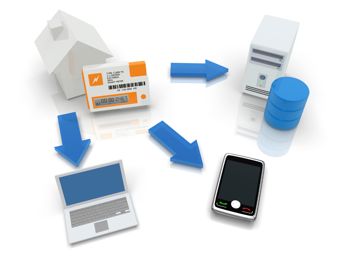A magazine where the digital world meets the real world.
On the web
- Home
- Browse by date
- Browse by topic
- Enter the maze
- Follow our blog
- Follow us on Twitter
- Resources for teachers
- Subscribe
In print
What is cs4fn?
- About us
- Contact us
- Partners
- Privacy and cookies
- Copyright and contributions
- Links to other fun sites
- Complete our questionnaire, give us feedback
Search:
Snooping smart meters

Could your electricity meter be snooping on you? Silently recording what you are up to, minute by minute, making it available to anyone who wants to know about the intimate details of your life? If it isn't it could be soon!
To read an old-fashioned electricity meter so you can be billed for the electricity you use, someone has to look at the display and write down the number shown. That's why there are an army of people who tramp the streets, knocking on doors, reading meters. Every single home in the country has to be checked several times a year. That's both expensive and inconvenient. Smart meters solve the problem by turning the meter into an internet-enabled computer giving them a two-way link back to the power company. That means your electricity use can be checked minute by minute. It's a lot cheaper but it also means that people can be charged more at peak times and less say in the middle of the night. Uneven usage is really difficult for power companies to handle - it means they have to have enough electricity available to cover the biggest peak possible even though it's only occasionally needed. Anything that evens out the load is really good for them. Some people believe that pricing like this could also lead to people reducing the amount of electricity they use overall which would be good both for bills and for the planet.
There is a downside to smart meters though. They will also allow the electricity companies to snoop on everyone's lives if they want to. They will be able to tell when you are watching TV and even what you are watching, whether you are on holiday, or that you are in the kitchen boiling the kettle, even if you just put your baby to bed.
Once your usage is being recorded in minute-by-minute detail that data can be analysed for patterns. Researchers have shown that different gadgets use electricity in different ways and those patterns can be picked out. Boil a kettle and it will stand out as a spike in your usage. TVs have their own pattern of energy usage that will vary depending on what is being watched. Baby monitors have a distinctive pattern too: that's how a snooper could work out when your baby went to bed. Why would anyone bother? Well the data gathered might be worth money - it could be used by companies to gather profiles about people, perhaps to sell to advertisers. It might also be used by burglars or just people who want to pry such as the tabloid press.
This all may be a problem, but another way of thinking about it is as an opportunity for engineers. The meters obviously have to have strong security that cannot be cracked. That just prevents anyone listening in but what if you don't want even the power company to be able to snoop on you? Can engineers invent ways for people to block the leakage of information to the meter in the first place? That is the challenge that Georgios Kalogridis and a team from Toshiba Research in Bristol took up. They have shown that it is possible to manage the electricity usage so that the underlying patterns are hidden. What they did was introduce a rechargeable battery between the rest of the system and the smart meter. Their system mixes up the power usage, using the battery as a reservoir of electricity, changing where the peaks and troughs are, so that no information actually leaks out of the house.
So privacy could be a problem with smart metering. An engineer's job is to solve problems, though. Just because it is the power company's meter, doesn't mean you can't keep them in the dark!


